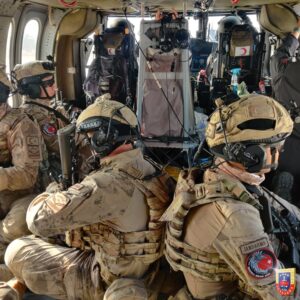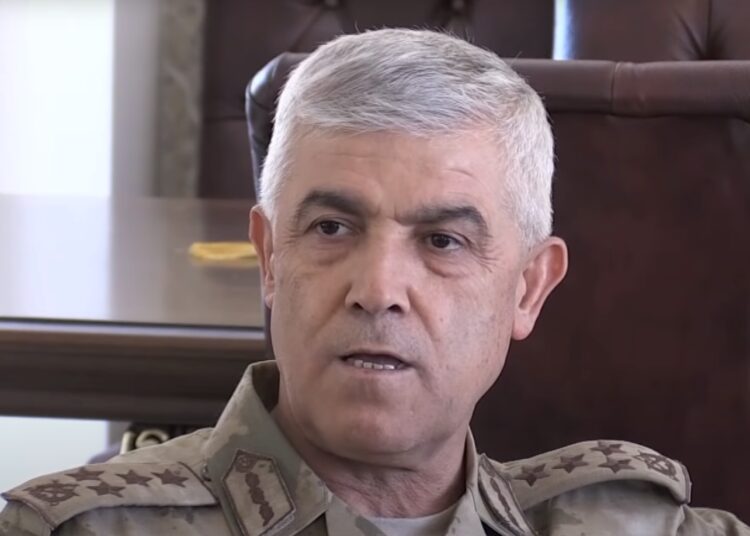Abdullah Bozkurt/Stockholm
Turkey’s second-largest law enforcement agency, the Gendarmerie, which is a member of the NATO Stability Policing Centre of Excellence (NATO SP COE) and the International Association of Gendarmerie and Police Forces with Military Status (FIEP), is led by a general who has been associated with organized crime syndicates and mafia groups that run criminal enterprises ranging from drug trafficking to loan sharking.
Gen. Arif Çetin, the head of Turkey’s gendarmerie (Jandarma Genel Komutanlığı), is alleged to have enriched himself through substantial cuts from the sale of illegal goods and bribes provided by notorious crime figures. In exchange for these payments, it is claimed that the gendarmerie turned a blind eye to criminal activities. Furthermore, there are reports of a large photo album featuring the general, showing him posing with notorious criminal figures, some of whom have been indicted, convicted, and served time in the past.
Çetin commands the gendarmerie, an important law enforcement agency in Turkey with jurisdiction over 93 percent of the country’s territory, responsible for serving approximately 20 percent of the total population. The remaining areas are under the jurisdiction of the police department, the primary law enforcement agency.
With almost 200,000 personnel under his command (195,218 to be exact according to this year’s figures), the gendarmerie operates in rural and border areas that are of great importance to criminal syndicates. These areas are essential for their operations, involving the movement of drugs, human trafficking and smuggling of goods from abroad.
The gendarmerie officially operates under the Interior Ministry but is also a component of the Turkish military. It was originally designed to serve under the command of the General Staff, functioning as part of the armed forces during wartime or general mobilizations.
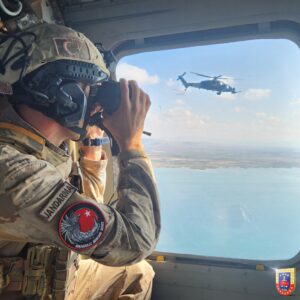
Given that the Turkish judiciary lacks its own investigative force to probe crimes, it relies on both the gendarmerie and the police to conduct investigations as part of the process pursued by public prosecutors. This situation puts Çetin in a highly valued position for criminal syndicates seeking to maintain their operations without interference or crackdown by judicial authorities.
Çetin’s association with crime figures, seemingly approved by Turkish President Recep Tayyip Erdogan, who is believed to have profited from these illegal enterprises, came to light when photos of him posing with notorious crime figures were posted online. In response, his lawyer quickly took legal action to censor photos and articles that showed or described him in the company of mafia and organized crime figures.
Çetin also played an important role in a 2016 false flag coup attempt, which led to a massive purge of veteran gendarmerie officers from the service. This included individuals who had specialized in areas such as organized crime, drug trafficking and armed jihadist organizations.
In January 2017 Galip Öztürk, a convicted organized crime boss who escaped to Georgia with the assistance of Turkish authorities to evade a prison sentence, released photos showing Çetin’s visit to Öztürk’s house, sitting around a dining table next to Öztürk and sharing a meal with him. The photos also revealed Öztürk visiting the general in his office.
The fugitive Öztürk managed to flee Turkey in 2018, after the Supreme Court of Appeals upheld his life sentence for murder. While in neighboring Georgia, he continued to oversee his criminal enterprise and even had interactions with Turkish embassy officials. However, his luck eventually ran out when he was tried, convicted and sentenced to eight years in Tbilisi after Georgian police discovered cocaine in his residence during a drug bust.
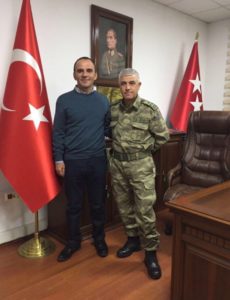

Ferhat Aydoğan, another convicted felon who had served time in a mafia case, was also photographed alongside Gen. Çetin. Two photos and messages shared by Aydoğan on X, formerly known as Twitter, on March 13, 2023 showed him expressing admiration for the general, who was visiting the mobile gendarmerie headquarters in the province of Kahramanmaraş. Aydoğan is well-known as the right-hand man of mafia boss Alaattin Çakıcı, is often regarded as his adopted nephew and is responsible for managing his public relations.
Çakıcı is undoubtedly one of the most notorious mafia leaders in Turkey. He has been convicted and served time on multiple charges, including involvement in organized crime and drug trafficking. Additionally, it is known that he had previously worked for Turkish intelligence agency MIT.
In a highly controversial move, Çakıcı was released from prison in April 2020, attributed to lobbying efforts by the far-right Nationalist Movement Party (MHP), an ally of Turkish President Erdogan. Since his release, Çakıcı has become part of the de facto coalition government in Turkey, comprising a combination of Islamists, far-right elements and neo-nationalists. He has played a key role in maintaining a climate of fear and targeting critics and opponents of President Erdogan’s government.
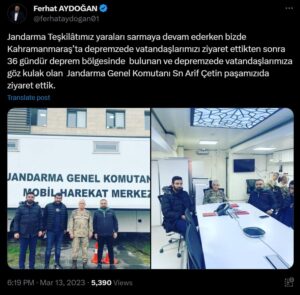
Another criminal figure hosted at gendarmerie headquarters by Gen. Çetin is Selahattin Yılmaz, who has a lengthy criminal record that includes extortion, illegal arms sales, smuggling of historic artifacts and acts of torture. His criminal history dates back to 1998, when he had a district mayor in Istanbul shot over a property dispute. In 2005, Yılmaz was arrested and subsequently tried on charges that included murder, assault and extortion along with 54 other suspects.
In 2008 Yılmaz was arrested for the illegal sale of firearms but managed to flee to Europe. Subsequently, in November 2010, Dutch police arrested him in Bergen Op Zoom, a city in the southwest of the Netherlands, and he was extradited to Turkey to face trial. Following the trial, in April 2013, he was sentenced to 10 years, five months in prison. He served part of his sentence before he was released in 2019.
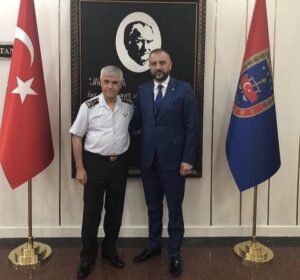
A notorious con man, Hüseyin Eryılmaz, who defrauded the iron and steel industry through forged invoices and shell companies, causing taxpayers to lose billions of lira, is yet another individual associated with Gen. Çetin. Eryılmaz has been indicted and is currently facing multiple charges. He was released from jail in January while awaiting the conclusion of his trial.
Evidence from the investigation file reveals that Eryılmaz had two judges in his pocket, providing them with cash and expensive gifts in exchange for information about legal actions taken by authorities against his business activities.

Gen. Çetin is also reportedly involved in business dealings with Cihan Ekşioğlu, a businessman who has been alleged to have acted as an intermediary between the Turkish president’s ruling party and mafia groups, both in Turkey and abroad. Ekşioğlu’s name has been linked to dubious business agreements, many of which were made at the luxurious five-star resort and hotel complex that was previously known as Paramount, located in Turkey’s tourist destination of Bodrum.
This resort, which Ekşioğlu allegedly took control of under pressure and threats to its ailing owner Atilla Uras, has been implicated in money laundering activities on behalf of global mafia groups. Uras passed away in June 2018 at the age of 81.
Ekşioğlu is alleged to have facilitated the entry of Botir Rakhimov, also known as Batyr Bukharsky or Bahtiyar İkramoğlu in Turkish, an Uzbek national and member of a Russian mafia network, into Turkey and helped him acquire Turkish citizenship through a 10 million euro bribery scheme. Rakhimov, who was wanted in Spain for money laundering activities on behalf of the Russian mafia, is said to have utilized the resort for money laundering purposes.
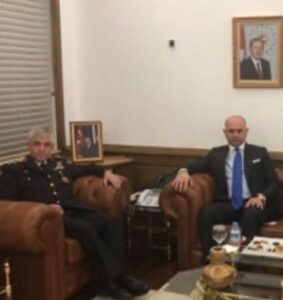
According to Yasemin Victoria Uras, who holds dual American and Turkish citizenship and is the daughter of hotel owner Atilla Uras, the Paramount resort was transferred to Rakhimov through a fraudulent scheme that eventually resulted in a lawsuit in Turkey and debt collection procedures. Victoria alleges that Ekşioğlu, reportedly with support from Gen. Çetin, forcibly took over the resort using a tank (or an armored military vehicle, as some accounts suggest) on June 26, 2018, the same day her father died under suspicious circumstances. This tank was purportedly provided by Gen. Çetin as a means to intimidate Victoria Uras.
Gen. Çetin also faced accusations of covering up a murder-suicide involving Yeldana Kaharman, a journalism student from Kazakhstan who worked for a local TV station in Turkey’s Elazığ province. Kaharman was found dead in her home on March 28, 2019, following allegations that she had been raped by Zülfü Tolga Ağar, a lawmaker from President Erdogan’s ruling Justice and Development Party (AKP) and the son of former Interior Minister Mehmet Ağar. Tragically, the 21-year-old Kaharman was found to have allegedly taken her own life a day after she had filed a complaint of rape with the gendarmerie.
The victim was reportedly raped by Ağar in the town of Pertek, where she had been invited for an interview with the lawmaker. After the incident, she went to the gendarmerie garrison in the town to file a complaint of rape. It has been alleged that Gen. Çetin not only arranged for an official helicopter to extract the lawmaker from the town but also played a role in making the complaint disappear.

Kaharman’s autopsy report was missing for two years until journalist Baransel Ağca managed to obtain a copy and publish it. The report was riddled with contradictions, intensifying suspicion that it had been tampered with. Some findings in the report raised concerns that Kaharman may have already been deceased when she was hanged from the ceiling in the kitchen of her home.
For instance, the report mentioned the presence of bruises in the neck area, but it also indicated that no significant bleeding or hematoma was found, and there was no damage to the soft tissue, bone or cartilage in the neck. These observations raise suspicions that Kaharman may have been hanged after being killed, rather than having been strangled.
Additionally, the report’s author, Dr. Selma Düzer, has a controversial background. She had previously faced legal action for allegedly concealing evidence in a case involving the suspicious death of a soldier in the town of Hozat.

Sedat Peker, a mobster who had once been an ally of President Erdogan but turned against him, started revealing damaging information about his former associates and shared details about Kaharman’s case. He claimed that the victim was transported by a gendarmerie helicopter after the incident, allegedly under orders from Çetin, and that the murder was covered up to protect the lawmaker. Both Ağar and Çetin denied the allegations.
Since 2014 the government of President Erdoğan has introduced a number of administrative and legislative changes to transform the gendarmerie into a partisan force, with massive purges of veteran officers from its ranks. The changes came immediately after the gendarmerie was involved in intercepting illegal arms shipments to jihadists in Syria in January 2014, exposing the Erdoğan government’s secret and illegal operation to arm jihadists using Turkish intelligence service MIT.
Yeldana Kaharman’s autopsy report:
Çetin was rewarded by the Erdogan government for his clandestine services and his association with organized crime networks. As a major general, he held the position of chief of operations at the Gendarmerie General Command when the false flag coup attempt occurred in 2016. On July 15 he ordered his subordinates to report to General Command headquarters, citing intelligence about a pending terrorist attack on the building. Those who complied with his orders were subsequently arrested and imprisoned on charges related to the coup.
Çetin never testified in the coup trials, despite multiple motions by defense lawyers who requested that the court compel him to appear for cross-examination. For his role in the major purge and allowing new recruitment based on a commitment to political Islamist and Turkish nationalist ideologies, Erdogan promoted him to the rank of lieutenant general in 2016 and made him the commander of entire gendarmerie force a year later. He is the longest serving commander in the century-long history of the Turkish gendarmerie.
